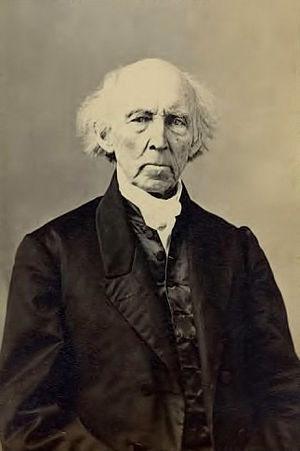- Chester Dewey
-
Chester Dewey (October 25, 1784 – December 15, 1867) was an American botanist, clergyman and educator.
Contents
Early life
Dewey was born in Sheffield, Mass. October 25, 1784, and studied for the ministry at Williams College, graduating in 1806. He officiated at Tryingham, Massachusetts. Even though he gave up preaching as his primary profession after only a few months, he never really retired from the pulpit. For the remainder of his life he accepted frequent invitations to preach, in scores of churches in many places and did nearly as much work of this kind as if preaching were his only occupation. Dewey was professor of mathematics and natural philosophy at Williams College from 1810 to 1827. From 1850 until 1860 he was professor of chemistry and natural philosophy in the University of Rochester.
Personal life
Dr. Dewey married Sarah Dewey of Stockliridge, Mass., in 1810 and had five children. She died in 1823. In 1825 he married Olivia Hart, eldest child of Lemuel Pomeroy, of Pittsfield, Mass.
Career
Dewey's entire life was given to scientific pursuits, and he held a high position among American naturalists. He made the study of grasses a specialty, and discovered and described several new species. The degree of M.D. was conferred upon him by Yale in 1825, D.D. by Union in 1838 and LL.D. by Williams in 1850. He was a careful and accurate observer of the weather, and his notes were published in regular monthly reports. His papers on some of the "Families and Natural Orders of Plants", published in the American Journal of Science, attracted the attention of some of the leading European botanists, and led to a correspondence with them. In the class of "carices" he was a recognized authority, and his writings on that subject make an elaborate monograph, upon which he labored for more than forty years. His "History of the Herbaceous Plants of Massachusetts" was published by that state. His latest writings were review articles on "The True Place of Man in Zoology" and "An Examination of Some Reasonings Against the Unity of Mankind."
In botany, Dewey is known chiefly as a tireless student of the largest genus of flowering plants, the intricate and highly technical genus Carex. For 43 years (1824–1867) he contributed with almost clock-like regularity to the pages of the American Journal of Science a series of papers entitled "Caricography". Recognized by his contemporaries as one of the few outstanding authorities on a perplexing and not at all showy group, he seems at the same time to have been looked at askance by the more cautious of them.[who?] Now, many more of his specific propositions are recognized than during his lifetime. Dewey's important collections contained 97 types of species and varieties proposed by him.
Death
He died in Rochester, New York on December 15, 1867. At his death in 1868 Dewey bequeathed his herbarium, one of the most complete in the country, as well as his carices library to Williams College.
References
- Appleton's Cyclopcedia of American Biography
- Proceedings, American Philosophical Society (vol. 85, 1942)
- Semi-centennial history of the city of Rochester, with illustrations and biographical sketches of some of its prominent men and pioneers (1884)
External links
- Chester Dewey
- Chester Dewey's Introductory lecture delivered to the medical class of the Berkshire Medical Institution: August 5, 1847
- This article incorporates text from an edition of the New International Encyclopedia that is in the public domain.
Categories:- Botanists with author abbreviations
- American botanists
- American academics
- American scientists
- Williams College alumni
- University of Rochester faculty
- People from Berkshire County, Massachusetts
- 1784 births
- 1867 deaths
Wikimedia Foundation. 2010.

